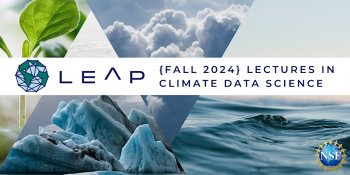Fall 2024 Lecture in Climate Data Science

Title: “Hops, Skips, and Jumps: Development Activities Around CAM7”
Speaker: Brian Medeiros (NCAR)
Format: Hybrid (NOTE: Brian will be presenting via Zoom; in-person guests are invited to the Innovation Hub to view his Lecture together)
Virtual: Zoom link provided upon registration
*Please note that in-person space is limited.*
__________________________________________________________________________________
Abstract: The development cycle of the Community Earth System Model (CESM) and its atmospheric component, the Community Atmosphere Model (CAM) is long and tortuous. This lecture presents changes being introduced for CAM version 7 and describes the processes involved in developing CAM, including some of the challenges and compromises. Supporting model development, as well as users and their applications, creates a small ecosystem of tools, documentation, and communication channels. Some of these will be highlighted, including the development of updated diagnostics software and tools that facilitate novel numerical experiments. Ongoing projects that push the boundaries of CESM and CAM, including those from LEAP, will be described to start sketching what future versions might look like.
Bio: Brian Medeiros is a Project Scientist in the Atmospheric Modeling and Predictability Section of the Climate and Global Dynamics Laboratory. He received his PhD in atmospheric sciences from UCLA in 2007, and before that his BA in physics from UC Berkeley in 2000. His research deals with the role that clouds and other small-scale processes play in the climate system. Much of his research revolves around the idea that unresolved processes in climate models strongly impact the mean climate, variability, and climatic change. The unresolved processes, like clouds, convection, and turbulence, are “parameterized” in climate models in an attempt to capture their statistical effects. These processes interact with each other and with the resolved flow, adding nonlinearities and complexity to the system. Dr. Medeiros has been especially interested in the connections between the turbulent boundary layer and low-level clouds, which are thought to be important for understanding future climate change. To better understand these issues, Dr. Medeiros’ research centers on evaluating clouds and boundary layers in climate models using a variety of tools and methods. He has conducted comparisons of models, focusing on aspects such as the structure of the boundary layer, the fidelity of the clouds, and the disagreement in climate sensitivity. Using idealized model configurations, such as aquaplanets, short-term forecasts, and single-column models, has been an ongoing research theme. Dr. Medeiros has also used observations from satellites, radiosondes, field campaigns, and reanalyses for model evaluation and to better understand the distributions of boundary layer depth and cloud regimes.
Time: 12:00 pm EDT
Free!
